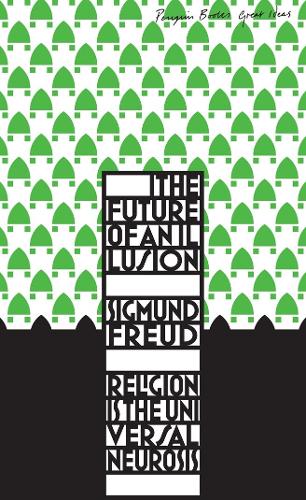
The Future of an Illusion
(Paperback)
Publishing Details
The Future of an Illusion
By (Author) Sigmund Freud
Penguin Books Ltd
Penguin Books Ltd
27th October 2008
7th August 2008
United Kingdom
Classifications
General
Non Fiction
Psychoanalytical and Freudian psychology
200.19
Physical Properties
Paperback
112
Width 111mm, Height 182mm, Spine 8mm
73g
Description
'Religion is the universal neurosis' Sigmund Freud This investigation of religion by greatest psychoanalyst of the twentieth-century explores the role faith can take in the life of man, what it can mean to us and why as a species we are inclined towards it. Throughout history, some books have changed the world. They have transformed the way we see ourselves - and each other. They have inspired debate, dissent, war and revolution. They have enlightened, outraged, provoked and comforted. They have enriched lives - and destroyed them. Now Penguin brings you the works of the great thinkers, pioneers, radicals and visionaries whose ideas shook civilization and helped make us who we are.
Reviews
"Gregory C. Richter's fluent new translation shows one of Freud's most popular books to be as clear, colloquial, and compelling as anything else by the master of psychoanalysis, and Todd Dufresne's entertaining introduction makes a good case for its surprising contemporary relevance, in spite of its often puzzling arguments."--Thomas Kemple, University of British Columbia
"This new edition and translation of Sigmund Freud's The Future of an Illusion has much to recommend it. The Introduction, in particular, is a gem of insightful analysis of the conflicting motives and logical inconsistencies that characterize Freud's arguments in this controversial essay. In laying bare the contradictions inherent in this work, Dufresne brings a fresh and incisive understanding to a book that, despite well-justified skepticism about its scientific merits, remains a thought-provoking and quintessentially Freudian explication of religious belief."--Frank J. Sulloway, University of California, Berkeley, and author of Freud, Biologist of the Mind: Beyond the Psychoanalytic Legend and Born to Rebel: Birth Order, Family Dynamics, and Creative Lives
"This new Broadview Press edition is a wonderful example of rigorous and imaginative scholarly collaboration. Gregory Richter provides a lucid and lively translation, and some searching reflections on the problems of translation, while Todd Dufresne contextualizes Freud's puzzling, late life assault on organized religion, and his equivocal embrace of Enlightenment positivism. Oskar Pfister, one of the book's earliest and most cogent critics, is also discussed with admirable clarity and charm. Bravo!"--Daniel Burston, Duquesne University, and author of The Legacy of Erich Fromm
Author Bio
Sigmund Freud was born in 1856 and died in exile in London in 1939. As a writer and doctor he remains one of the informing voices of the twentieth century.
